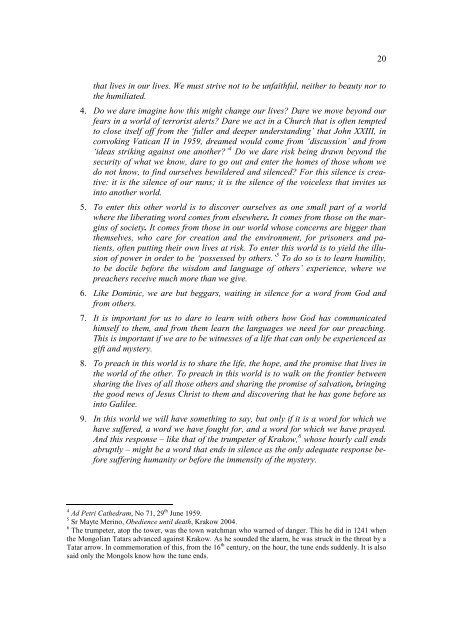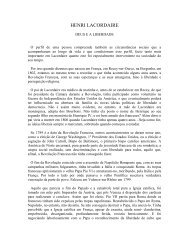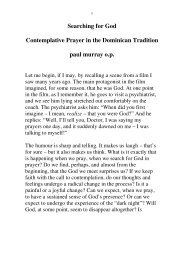acta capituli generalis diffinitorum ordinis praedicatorum fr. carolo a ...
acta capituli generalis diffinitorum ordinis praedicatorum fr. carolo a ...
acta capituli generalis diffinitorum ordinis praedicatorum fr. carolo a ...
You also want an ePaper? Increase the reach of your titles
YUMPU automatically turns print PDFs into web optimized ePapers that Google loves.
that lives in our lives. We must strive not to be unfaithful, neither to beauty nor to<br />
the humiliated.<br />
4. Do we dare imagine how this might change our lives? Dare we move beyond our<br />
fears in a world of terrorist alerts? Dare we act in a Church that is often tempted<br />
to close itself off <strong>fr</strong>om the ‘fuller and deeper understanding’ that John XXIII, in<br />
convoking Vatican II in 1959, dreamed would come <strong>fr</strong>om ‘discussion’ and <strong>fr</strong>om<br />
‘ideas striking against one another?’ 4 Do we dare risk being drawn beyond the<br />
security of what we know, dare to go out and enter the homes of those whom we<br />
do not know, to find ourselves bewildered and silenced? For this silence is creative:<br />
it is the silence of our nuns; it is the silence of the voiceless that invites us<br />
into another world.<br />
5. To enter this other world is to discover ourselves as one small part of a world<br />
where the liberating word comes <strong>fr</strong>om elsewhere. It comes <strong>fr</strong>om those on the margins<br />
of society. It comes <strong>fr</strong>om those in our world whose concerns are bigger than<br />
themselves, who care for creation and the environment, for prisoners and patients,<br />
often putting their own lives at risk. To enter this world is to yield the illusion<br />
of power in order to be ‘possessed by others.’ 5 To do so is to learn humility,<br />
to be docile before the wisdom and language of others’ experience, where we<br />
preachers receive much more than we give.<br />
6. Like Dominic, we are but beggars, waiting in silence for a word <strong>fr</strong>om God and<br />
<strong>fr</strong>om others.<br />
7. It is important for us to dare to learn with others how God has communicated<br />
himself to them, and <strong>fr</strong>om them learn the languages we need for our preaching.<br />
This is important if we are to be witnesses of a life that can only be experienced as<br />
gift and mystery.<br />
8. To preach in this world is to share the life, the hope, and the promise that lives in<br />
the world of the other. To preach in this world is to walk on the <strong>fr</strong>ontier between<br />
sharing the lives of all those others and sharing the promise of salvation, bringing<br />
the good news of Jesus Christ to them and discovering that he has gone before us<br />
into Galilee.<br />
9. In this world we will have something to say, but only if it is a word for which we<br />
have suffered, a word we have fought for, and a word for which we have prayed.<br />
And this response – like that of the trumpeter of Krakow, 6 whose hourly call ends<br />
abruptly – might be a word that ends in silence as the only adequate response before<br />
suffering humanity or before the immensity of the mystery.<br />
4 Ad Petri Cathedram, No 71, 29 th June 1959.<br />
5 Sr Mayte Merino, Obedience until death, Krakow 2004.<br />
6 The trumpeter, atop the tower, was the town watchman who warned of danger. This he did in 1241 when<br />
the Mongolian Tatars advanced against Krakow. As he sounded the alarm, he was struck in the throat by a<br />
Tatar arrow. In commemoration of this, <strong>fr</strong>om the 16 th century, on the hour, the tune ends suddenly. It is also<br />
said only the Mongols know how the tune ends.<br />
20










